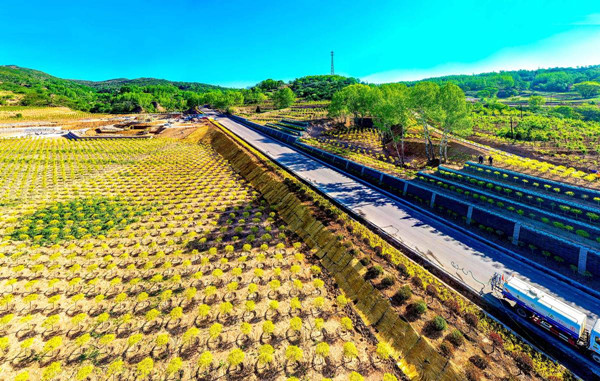Diversification helps create better lives
Updated: 2021-05-11

A paved road runs through vineyards in Zuoquan county, Shanxi province. [Photo by Xing Lanfu for China Daily]
Fresh thinking is benefiting residents of isolated communities in North China
Zuoquan county, in the northern province of Shanxi, was once called Liaoxian county.
However, in September 1942, it was renamed after Zuo Quan, a general with the Eighth Route Army, four months after his death in the county as he and 2,000 comrades attempted to break out of an encirclement by the Japanese army.
The county, deep in the Taihang Mountain Range, was easy to hold but hard to attack, which was why the army chose to establish its headquarters there for five years.
However, the mountains, a natural defensive position during the War of Resistance Against Japanese Aggression (1931-45), also formed a natural obstacle that hindered local residents' access to the outside world and sowed the seeds of poverty.
During the most difficult times, before the start of a nationwide poverty alleviation campaign in 2012, 49,286 people, or 21.77 percent of Zuoquan's population, lived in abject poverty.
Thanks to comprehensive measures the county has taken since then, supported by higher authorities, Zuoquan was removed from a list of national-level poverty-stricken areas in April 2019 because none of its residents lived below the local poverty line of about $2 a day.
With 286 dwellings, Zuoquan's Shangwu village enjoys a tranquil setting, clean air, a cool climate and a pristine environment. It is the perfect example of the county's poverty alleviation efforts.
Last month, the road that has connected Shangwu to the outside world since 1985 was upgraded, so the village is becoming a base for cycling tours. Some cyclists happily travel the 480 kilometers from Beijing to enjoy the tranquil location.
Villager Liu Cuiping, who runs a two-bedroom homestay, has benefited from the tourism boom. The county government provided her with a 20,000 yuan ($3,000) subsidy to improve the rooms at her homestay.
She said her business was closed until July as a result of the novel coronavirus outbreak, but the monthly income from the homestay has remained above 1,000 yuan since then. That's a sizable amount for local people, who had lived on less than 7 yuan a day for generations.
Liu Junfei, the village Party secretary, said cultivation of corn and millet used to be the main source of income. In mid-2014, more than 60 percent of Shangwu's 711 residents were still living in poverty, while few families had indoor sanitation.
Diversification
He added that it was hard for villagers to change their traditional crops, but some were forced to do so in order to escape poverty.
It was a "rewarding option" and the villagers diversified by planting peaches, plums, apricots, grapes and walnuts, as well as vegetables and other cash crops.
The farmers sell the produce directly to tourists or online, saving heavy logistics costs.
Liu Junfei said the village is now home to 20 homestays and three family inns and restaurants. The men go to cities as migrant workers, while the women stay home to take care of the children. They work in the tourism and catering sectors while also collecting herbs to boost family incomes.
"The village will strive to develop tourism and make it a reliable source of income in the future," he said.
Neighboring Zecheng village has taken the same development path and now has 37 homestays.
Wen Zhixian, deputy head of the Zuoquan county government, said authorities are calling on residents to tap into the natural environment and picturesque landscape of the Taihang Mountains to develop the tourism and catering sectors.
The two villages are perched in a 58-kilometer-long valley known as the Taihang Gallery. A road that meanders through it connects them with the outside world, and the locals call it an "artery" for tourism.
Wen said the county government has planted about 288,000 gold-leafed trees of various types on the mountain slopes on both sides of the road in a bid to make it a popular route for self-driving visitors and touring cyclists.
To attract tourists and make full use of the area's unique musical culture, the county government hosts a folk song festival every year.
Liu Erping, director of the county publicity department, said Zuoquan is seeking to breathe life into its tourism industry and make such development more sustainable by holding more folk music activities.
In addition to tourism and cash crops, photovoltaic power generation is helping to alleviate poverty.
'Little golden suns'
In Lianbi village, located on a rugged mountain slope, farmers lived a hand-to-mouth existence for generations before the road was extended to reach it about 10 years ago.
Guo Yinglin, 64, the village Party secretary, said it now takes less than 20 minutes to reach the county seat by car. In the past, some villagers had never visited the county seat because the journey involved a walk of at least two days.
On mountain slopes where the land is too infertile to farm, government guidance and subsidies have encouraged villagers to install solar panels.
Guo said the "little golden suns", which are connected to the electricity grid, generate about 1 million yuan each year for the village.
"The 'sun-given' money is exclusively spent on caring for the sick, disabled, low-income and widowed seniors in the village," he said.
"Each needy family receives 3,000 yuan a year from it."
Since 2016, China has invested more than 300 million yuan to build dozens of village "solar power stations", with an installed gross capacity of 80.27 megawatts.
That makes full use of the barren mountains and benefits 129 formerly poverty-stricken villages.
On the other side of the Taihang Range lies Lyuliang, a city that has enjoyed a similar rags-to-riches story.
Poor transportation also made Lyuliang a suitable military base for the CPC's forces during wartime, but it also kept local residents isolated from the outside world.
By the end of 2014, about 19 percent of its population, accounting for about 46 percent of Lyuliang's rural residents, lived in poverty.
However, a passenger train started operating in June 2018. It links Caijiaya village, the heartland of poverty-stricken Xingxian county, with Taiyuan, the provincial capital.
That has seen local specialties-such as millet, beans, rice, jujube and cooked wheat foods-gain access to a larger market and tourists have started flowing into the mountains by rail.
By the end of last year, the final batch of 5,312 impoverished residents from 2,504 families in Lyuliang had bid farewell to poverty.



